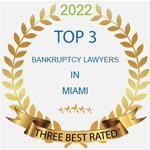Kingcade Garcia McMaken – Bankruptcy Attorney | Video Transcript
SPERO CANTON: Shedding the stigma of bankruptcy up next on Comcast Newsmakers.
FEMALE VOICE: Bringing you the news and information you need from the people making a difference. This is Comcast Newsmakers.
SPERO CANTON: Hi, everybody. Welcome back to our show. The economic recession has some resonance, rethinking the option of bankruptcy. Here to discuss when filing might be the right choice during a financial hardship is this hour’s newsmaker bankruptcy attorney Timothy Kingcade of Kingcade Garcia McMaken Welcome to our show.
TIMOTHY KINGCADE: Thank you.
SPERO CANTON: People have a stigma, negative stigma, of bankruptcy, thinking they can’t get credit if that happens. Financially, they’re dead in the water. You’re saying that might not be true.
TIMOTHY KINGCADE: Well, I think you need to break it down. Before you think about the ramifications of post bankruptcy, you need to think about whether or not bankruptcy’s the right answer. Many people need bankruptcy.
And while there is some stigma attached to it, most people recover from bankruptcy much quicker than they think. There are myths with bankruptcy. Bankruptcy’s a bad word, so to speak. Many people associate very negative stigma with bankruptcy. However, most people recover from bankruptcy rather quickly.
SPERO CANTON: Now who should file for bankruptcy?
TIMOTHY KINGCADE: Well, bankruptcy is a remedy. So we should identify problems that bankruptcy will solve. Bankruptcy solves what we call unsecured debt, debt without collateral, in other words your credit cards, your medical bills. However, some people find themselves today in houses they can’t afford, that they’ll never be able to afford, that they probably shouldn’t have bought. Bankruptcy can eliminate the debt of the house, allow you to stay in the house a little bit longer.
At the end of the bankruptcy, you’re debt free. You have to move out of the house. But it does solve that problem as well.
SPERO CANTON: You say the end of the bankruptcy. Now what does that mean by that?
TIMOTHY KINGCADE: Well, the bankruptcy’s–
SPERO CANTON: When a bankruptcy’s filed.
TIMOTHY KINGCADE: Yes, sir, bankruptcy’s a process. You file a bankruptcy case. I strongly recommend you do it with an attorney. Most attorneys give free consultations in this day and age for bankruptcy. After a consultation, a bankruptcy is filed.
A judge will have to approve the bankruptcy. And basically at the end of the bankruptcy, you get what’s called a discharge. You, in other words, are discharged from your debts. Now you have the option in bankruptcy to keep your house. If you keep your house, you have to keep making the payments. If you’re behind on your payments and you don’t want the house anymore, however, the house can be included.
SPERO CANTON: What other types of bills are included? You’re talking about credit cards. You’re talking about tax–back taxes.
TIMOTHY KINGCADE: Credit cards, medical bills are automatically included in bankruptcy. Taxes owed to the IRS or if you’re in a state where you have state income tax are discharged if they’re over three years old. So if the filing date of the bankruptcy, for instance, is 2008, taxes from 2004 and before can be included in bankruptcy.
SPERO CANTON: Now is there–when you actually emerge from bankruptcy, what happens then? Can you get credit? Or are people going to stay away from you?
TIMOTHY KINGCADE: Well, it’s interesting to look at both sides of the coin. Introspectively, people probably think–why would anybody give me credit? I filed bankruptcy. I couldn’t pay my debts. However, we live in a credit-driven economy. What I mean by that is Detroit doesn’t sell cars unless people get credit. You can’t sell furniture if people can’t get credit for it. So there’s two sides to the coin in that after bankruptcy, you’re debt free. You can’t file bankruptcy again legally for eight years. And statistics indicate that very, very few people refile bankruptcy ever again in their life. As a result, your credit comes back. There are people willing to take risks with you. And we see most clients with a credit score of 700 or better two years after bankruptcy.
SPERO CANTON: Are you serious?
TIMOTHY KINGCADE: Yes, sir.
SPERO CANTON: So I thought that was a stigma that stayed with you for about seven years after.
TIMOTHY KINGCADE: Well, the bankruptcy can stay on your credit report. But remember, the first credit card you get after bankruptcy–and yes, I do mean you get credit cards after bankruptcy–if you file bankruptcy and list Citibank or Capital One in your bankruptcy, Citibank or Capital One will give you a new credit card almost instantly.
SPERO CANTON: Very quickly, who should file for bankruptcy?
TIMOTHY KINGCADE: Well, great question. There are cases that are more urgent than others. If you are being sued, if your wages are being garnished, if creditors are calling you, you should think about it.
SPERO CANTON: Okay. Thanks very much. This hour’s newsmaker Timothy Kingcade discussing the pros and cons of bankruptcy. I’m Spero Canton. Thank you for watching.
FEMALE VOICE: The preceding has been a presentation of Comcast Newsmakers. And now back to CNN Headline News.
















